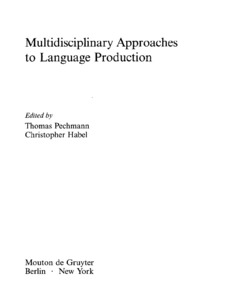Datum
2004Metadata
Zur Langanzeige
Teil eines Buches

Thematic information, argument structure, and discourse adaptation in language production
Zusammenfassung
In the minds of language users, situations are represented as states, processes, and events. Each such representation originates from perception, imagination, or illusion (cf. e.g., Glasersfeld 1972) and includes the partaking entities and the respective relations holding between them. Since situations cannot be represented by linguistic means in all their aspects, verbalization always requires schematization, i.e. the reduction of information. In the consequence, in linguistic expressions some of the information inherent in the situation to-be-verbalized is left implicit. Naturally, this entails that speakers have to make choices between alternate linguistic realizations; the more so as the to-be-verbalized conceptual structures can be expressed in a variety of ways depending on what facets of a situation a speaker wants to focus on.
Zitierform
In: Habel, Christopher; Pechmann, Thomas (Hrsg.): Multidisciplinary Approaches to Language Production. Mouton de Gruyter: Berlin 2004, S. 139-172; doi:10.1515/9783110894028, eisbn:978-3-11-089402-8, isbn:978-3-11-017840-1Zitieren
@inbook{doi:10.17170/kobra-202105123890,
author={Tappe, Heike and Härtl, Holden and Olsen, Susan},
title={Thematic information, argument structure, and discourse adaptation in language production},
pages={139-172},
publisher={Mouton de Gruyter},
year={2004}
}
0500 Oax
0501 Text $btxt$2rdacontent
0502 Computermedien $bc$2rdacarrier
1100 2004$n2004
1500 1/eng
2050 ##0##http://hdl.handle.net/123456789/12831
3000 Tappe, Heike
3010 Härtl, Holden
3010 Olsen, Susan
4000 Thematic information, argument structure, and discourse adaptation in language production / Tappe, Heike
4030
4060 Online-Ressource
4085 ##0##=u http://nbn-resolving.de/http://hdl.handle.net/123456789/12831=x R
4204 \$dTeil eines Buches
4170
5550 {{Wortwahl}}
5550 {{Argumentstruktur}}
5550 {{Generierung <Sprache>}}
5550 {{Repräsentation <Philosophie>}}
7136 ##0##http://hdl.handle.net/123456789/12831
<resource xsi:schemaLocation="http://datacite.org/schema/kernel-2.2 http://schema.datacite.org/meta/kernel-2.2/metadata.xsd"> 2021-05-18T09:14:35Z 2021-05-18T09:14:35Z 2004 doi:10.17170/kobra-202105123890 http://hdl.handle.net/123456789/12831 eng Mouton de Gruyter Urheberrechtlich geschützt https://rightsstatements.org/page/InC/1.0/ 420 Thematic information, argument structure, and discourse adaptation in language production Teil eines Buches In the minds of language users, situations are represented as states, processes, and events. Each such representation originates from perception, imagination, or illusion (cf. e.g., Glasersfeld 1972) and includes the partaking entities and the respective relations holding between them. Since situations cannot be represented by linguistic means in all their aspects, verbalization always requires schematization, i.e. the reduction of information. In the consequence, in linguistic expressions some of the information inherent in the situation to-be-verbalized is left implicit. Naturally, this entails that speakers have to make choices between alternate linguistic realizations; the more so as the to-be-verbalized conceptual structures can be expressed in a variety of ways depending on what facets of a situation a speaker wants to focus on. open access Tappe, Heike Härtl, Holden Olsen, Susan Berlin New York doi:10.1515/9783110894028.139 Wortwahl Argumentstruktur Generierung <Sprache> Repräsentation <Philosophie> publishedVersion Multidisciplinary Approaches to Language Production Habel, Christopher Pechmann, Thomas doi:10.1515/9783110894028 eisbn:978-3-11-089402-8 isbn:978-3-11-017840-1 139-172 Trends in linguistics. Studies and monographs (TiLSM) ;; 157 false </resource>
Die folgenden Lizenzbestimmungen sind mit dieser Ressource verbunden:
Urheberrechtlich geschützt

